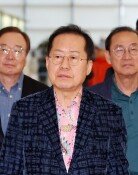Prelude to Return of Rich Nations` Power Trade
Prelude to Return of Rich Nations` Power Trade
Posted September. 17, 2003 22:57,
As the WTO ministers meeting held in Cancun, Mexico collapsed, there are raising concerns that they may now have to face bilateral deals where power prevails over logic.
In a protest against advance nations` threats, developing countries are even now suggesting that the WTO, which has shored up them, is useless. Thus, multilateral trading system is in jeopardy.
Some countries are more interested in rhetoric than serious negotiation, the press of the United States and Britain quoted U.S. Trade Representative Robert B. Zoellick as saying in their leading article. Zoellick implied the U.S. may pursue discriminatory trade policies against each country by saying, The U.S. will now pursue bilateral free trade agreements
Moreover, as the Commerce Department coincidently announced Monday that the total current account deficit of the first half of a year recorded the lowest ever, mounting 2,773,378 million, the business circles of the U.S. are now more likely to take hard-line stance.
Bush administration which now faces a worst `double deficit` due to the snowballing costs of Iraqi reconstruction, is now likely to make the most out of bilateral deals, under retaliatory measures, such as Super 301 provisions of the trade law, anti-dumping and safeguard.
The European Union, which concentrated their efforts in multilateral deals, also plans to fully review their trading strategies. I shall soon decide whether we continue to maintain this in favor of multilateralism or turn toward bilateral talks, the European Trade Commissioner Pascal Lamy said Tuesday.
In the U.S., China`s unfair trading practice which has inflicted 25% of its trading deficit is now a hot issue.
Above all, the decision making process of the WTO where members unanimously agree to pass a bill is now becoming the subject of much debate.
The intent is to provide an equal voice to member countries but it is now bring criticized to be highly inefficient, as one dissent voice out of 146 members can halt negotiations. Advanced countries, including the U.S. has proposed to give greater voting right to countries that carry out greater volume of trade, but developing countries are strongly opposing it
Developing countries of Africa are also saying they may drop out of the WTO.
"Cancun meeting did not keep its promise of rich countries that it will drive out poverty and lift lifestyle, said Vijay Makhan, the African Union`s Commissioner for Trade, Industry and Economic Affairs Tuesday. "If things don`t change, then Africa will have to take a political decision whether it is worthwhile to stay in the WTO.
Reflecting such trend, The Washington Post noted Tuesday that Globalism, that WTO had stood aside, seems to unveil its limit.
Experts worry that if multilateral negotiations of the WTO do not reach an agreement by next year but collapses, rich and poor countries may both be damaged.
Advanced economies may only have to confront with difficulties in terms of time and procedure, as they have to deal trading countries one by one, while small sized economies may have to face with harsh walls as they may encounter blockage of foreign markets
Countervailing tariff imposed against semiconductors of Hynix or steel products is a good example found in Korea. Korea could have escaped tougher retorsion of U.S., such as its Super 301 provisions, thanks to the WTO system. Even it could file a lawsuit through the WTO against unfair trading actions, such as countervailing duty and could reduce its burden.
There were strong opposition in the U.S. in 1995 when the WTO launched saying it will only harm the U.S. economy. They say collapse of the Cancun negations as if pleased. I believe the table has turned toward to bilateral negations, said An Deok-geun, professor of the post graduate school of international studies at Korea Development Institute.
ecopark@donga.com havefun@donga.com







